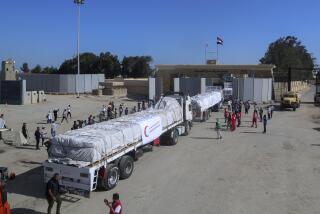Independence May Be Only Way to Save the Mission
- Share via
WASHINGTON — More than a year ago, the allied nations put an end to Serbian-sponsored barbarity in Kosovo and helped nearly a million Kosovars return home. But at its current pace, the international mission in Kosovo is likely to wind up profoundly disappointing the people it intervened to protect.
Instead of quickly securing the province, rebuilding its infrastructure, establishing the rule of law, creating strong, central institutions and encouraging self-governance, allied nations have tolerated a porous border with Serbia and permitted a Belfast-like partition of the northern city of Kosovska Mitrovica, enabling Yugoslav President Slobodan Milosevic to pursue his destabilizing agenda in Kosovo. The international presence has morphed into a colonial administration hamstrung even in its simplest tasks by a dearth of funds, trained personnel and real decision-making authority. Criminal and revanchist gangs have filled the vacuum created by the absence of law and law enforcement.
Despite the impression left by media accounts, Kosovo’s postwar violence has not been generated by Albanians alone. While it’s indisputable that Serbs and other minorities have been targeted, it was Serb attacks on aid workers that temporarily drove the international relief organizations out of the Serb-dominated portion of Kosovska Mitrovica in late June. Both Albanian and Serb civilians have been gunned down in the streets, and evidence suggests that a recent attack on a Serb Orthodox Church was carried out by Serbian state-run “special forces.”
Perhaps this summer’s most hopeful sign is the excitement over municipal elections slated for October, which have spurred the formation of dozens of political parties. But most of the parties are distinguished by personality rather than platform, and although voter registration was hugely successful among Albanians, only a few hundred of Kosovo’s estimated 100,000 Serbs registered to vote.
Many of Kosovo’s woes can be traced to the international community’s reluctance to come to grips with the issue of the territory’s final legal status. Under U.N. Security Council Resolution 1244, the legal authority for the international mission, Kosovo is to remain a part of Serbia. Many international actors prefer it that way either out of a long-standing sympathy for the Serb people, as is the case for France, Greece and Russia; a fear of setting a precedent that could have ramifications close to home, as could be the case for Britain (Northern Ireland), Turkey (the Kurds) and Russia (Chechnya); or an aversion toward rewarding separatist guerrilla movements, in general, and fueling pan-Albanian aspirations, in particular.
For these reasons, the U.N. resolution has become a convenient excuse not to address head-on the pressing issue of Kosovo’s independence. Continued violence against Serbs, generally interpreted as “reverse ethnic cleansing,” has also dampened Western appetites for bestowing more power upon the emerging Albanian leadership. Any further delay of the independence discussion, however, risks allowing this pent-up, 800-pound gorilla to be made into more than an imagined threat by an increasingly restless population fed up with continued lack of security, instability and uncertainty. An open-ended prolongation of Kosovo’s limbo status can only lead to opportunistic power grabs by irredentists, criminal groups and those under Belgrade’s sway.
There are four additional reasons for a sooner-rather-than-later approach to Kosovo independence:
* Through its state-sponsored 1998-99 campaign of terror and forced expulsions, Serbia has forfeited any credible legal claim to sovereignty over Kosovo.
* Laying out a path toward independence would help disabuse the Serb population, both in Kosovo and in Serbia proper, of any further illusions regarding Belgrade’s “Greater Serbia” agenda. With Montenegro’s separation apparently only a matter of time, Milosevic’s greatest legacy will be to have shrunk Serbia.
* It was Milosevic who lost Kosovo and should pay the political price, not the feckless Serbian opposition, which is likely to have enough trouble running any transitional government without having to justify a hand-over of Serbia’s “holy land” to Albanians.
* The vast majority of Kosovo’s residents have demonstrated, in both their decade-long management of a parallel system of government and the alacrity with which they have rebuilt their homes, impressive creativity, industry and follow-through. An expeditious end to their status as beneficiaries of international assistance can only spur their development as self-reliant citizens eager.
The international community should work closely with representatives of all constituencies in Kosovo to draw up an agreed-upon list of conditions to be met before Kosovo’s independence can finally be earned. Such a road map should begin with palpable improvement in the human rights situation and a fair and peaceful outcome to the upcoming municipal elections, which should be followed quickly by province-wide elections that can endow Kosovo’s leaders with real authority and help to build strong institutions.
NATO’s Kosovo Force (KFOR), the U.N. and donor nations must follow through on their respective commitments. KFOR should continue to provide vigorous security and adequate detention facilities for the foreseeable future. Donor nations, working through the U.N. and the Organization for Security and Cooperation in Europe, must deliver on their promises of several thousand more international police, functioning courts, salaries for teachers and doctors who could be serving Kosovo’s residents instead of working as drivers and translators for the international community, and basic infrastructural repairs.
Having freed the people of Kosovo from a repressive regime, the allies’ mandate should be to help them learn to govern themselves. Providing an umbrella of security, a road map and a timetable for fulfilling that goal is the international community’s only real exit strategy. *
More to Read
Sign up for Essential California
The most important California stories and recommendations in your inbox every morning.
You may occasionally receive promotional content from the Los Angeles Times.













